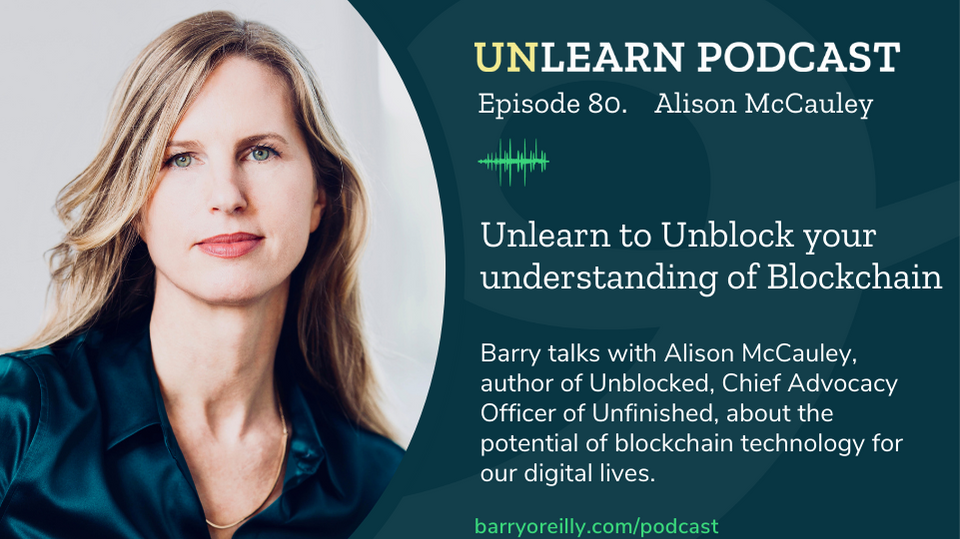Alison McCauley, author of Unblocked, is the Chief Advocacy Officer of Unfinished an organization focused on strengthening civic life in the digital age. She is a sought after keynote speaker at conferences over the world and her LinkedIn Learning course about how the blockchain will change business has been taken by over 70,000 students. Alison joins Barry O’Reilly in this week’s show to talk about understanding the potential of blockchain technology for our digital lives.
The Moment of Revelation
Most of us have moments when a new idea lands like a bolt of lightning and seems to change everything. Alison had been working in emerging technology for decades when she came across the idea of blockchains, and what they could mean for people and organizations. She immediately set out to generating the key questions that would help her learn exactly what experts and experimenters in the space were trying to discover. These questions became an infinite unfolding of ideas because of far-reaching implications of blockchain technology. [Listen from 2:00]

Keeping up with Exponential Growth
There is more happening, every day, in the evolution and development of blockchain technology than anyone can keep up with. Even young, energetic technologists without many outside commitments are working 17 hours a day and unable to stay on top of what is happening in their small sliver of the space. Alison shares about how learning circles in different areas create a structure for learning and sharing information that makes it possible to progress. She predicts that success is going to go to the people who can most quickly and effectively absorb and synthesize information. [Listen from 7:35]
(Listen to Stepping into the Metaverse with Aaron Frank)
The Messy Middle
Not everyone involved in emerging technologies has excellent intentions – there are nefarious actors, and even the best intentioned projects can go off the rails. Barry asks Alison what people should be looking for to determine if things are moving in a positive direction, or otherwise. Alison makes the point that you can learn from every project, even those that go wrong, and one of the challenges is to be cautious while still being open to the learning. “If you’re able to hold a healthy skepticism and an open mind in the same space… you have the most intense opportunity for learning.” [Listen from 13:40]
Skin in the Game
To really learn in this space, you should have skin in the game. She recommends putting skin in the game–making a small investment for the sake of learning and understanding the theories and processes involved – that kind of practical education is much richer than other types of learning, like reading an article. This isn’t financial or investment advice, but you can experiment and gain practical knowledge by getting involved through small investment in cryptocurrency, or bidding on an NFT. [Listen from 21:40]
(Listen to Designing DAOs with Ja-Naé Duane)
Experimentation
While the ultimate uses of blockchain technology are just starting to be discovered, communities are already using it to change the way people collaborate and work together. “If you’re not experimenting with it now in some kind of applied way, I think you’ll be very blindsided in three to five years.” Alison warns. Barry shares the example of Nobody Studios which is crowdfunding equity, something equally new and unfamiliar, and you can extrapolate it further and look at how people are using DAOs to change the way people can contribute and how they are compensated for doing so. There are new and exciting ways to fund projects you are interested in – and even the possibility of being paid to learn or play. [Listen from 27:40]
A Sense of Belonging
As DAOs are being developed, communities are being formed as well. The rewards of participation aren’t only financial, and Alison shares the story of a highly paid lawyer who volunteered his time on some contracts for a DAO. He told Alison that he valued what the organization was doing and realized “I can make a contribution here. I can help.” It was the ability to contribute that drove his desire to do so. This is how many people are starting to prioritize their time and effort. We all want to contribute to communities and causes we believe in – and this new technology makes doing so accessible. Barry agrees and goes on to talk about the power of the community to solve huge problems. [Listen from 33:45]















